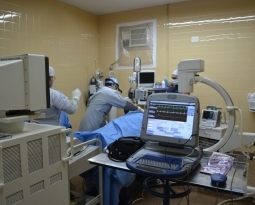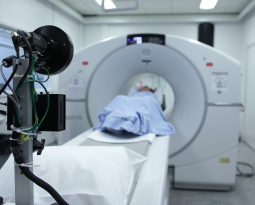Maryland Patent of the Month – September 2023
IonQ, Inc. is set on bringing quantum computing to real-world applications. To achieve this, the company is working to build the world’s best quantum computers to solve the world’s most complex problems.
In line with this effort, the company has recently patented a method aimed at revolutionizing the way simultaneous entangling gate operations are performed in a trapped-ion quantum computer.
At the heart of this innovation is a method that allows for the simultaneous entanglement of multiple pairs of ions within a chain of trapped ions. In quantum computing, entanglement is a fundamental concept where the quantum states of particles become correlated in such a way that their properties are interconnected, even when separated by vast distances.
Here’s a simplified breakdown of what IonQ’s invention entails:
Imagine a chain of trapped ions, each having two distinct states that define a qubit, the fundamental unit of quantum information. IonQ employs lasers to interact with these ions. These lasers are split into multiple non-copropagating laser beams, which are directed at each ion. The laser beams induce Rabi flopping of the ions between their two hyperfine states, effectively preparing them for quantum computation. IonQ’s method then computes a set of amplitudes for a series of pulses that will entangle multiple pairs of ions in the chain simultaneously. This is a game-changer, as traditional methods require complex and resource-intensive operations for each entanglement.
The method carefully selects amplitudes for each pulse, ensuring that only the desired pairs of ions become entangled, while others are decoupled. This precision is vital for minimizing errors and resource usage. These entangled ions are then used to perform quantum computations. The results are measured by observing the population of qubit states. To top it off, IonQ employs digital computers with specially crafted software to control and optimize the quantum operations. This ensures that the quantum algorithm is executed flawlessly.
Quantum computing holds immense potential, from solving complex problems in cryptography and drug discovery to optimizing supply chains and simulating quantum systems. IonQ’s invention streamlines the process, making it more efficient and scalable.
Are you developing new technology for an existing application? Did you know your development work could be eligible for the R&D Tax Credit and you can receive up to 14% back on your expenses? Even if your development isn’t successful your work may still qualify for R&D credits (i.e. you don’t need to have a patent to qualify). To find out more, please contact a Swanson Reed R&D Specialist today or check out our free online eligibility test.
Who We Are:
Swanson Reed is one of the U.S.’ largest Specialist R&D tax advisory firms. We manage all facets of the R&D tax credit program, from claim preparation and audit compliance to claim disputes.
Swanson Reed regularly hosts free webinars and provides free IRS CE and CPE credits for CPAs. For more information please visit us at www.swansonreed.com/webinars or contact your usual Swanson Reed representative.

















